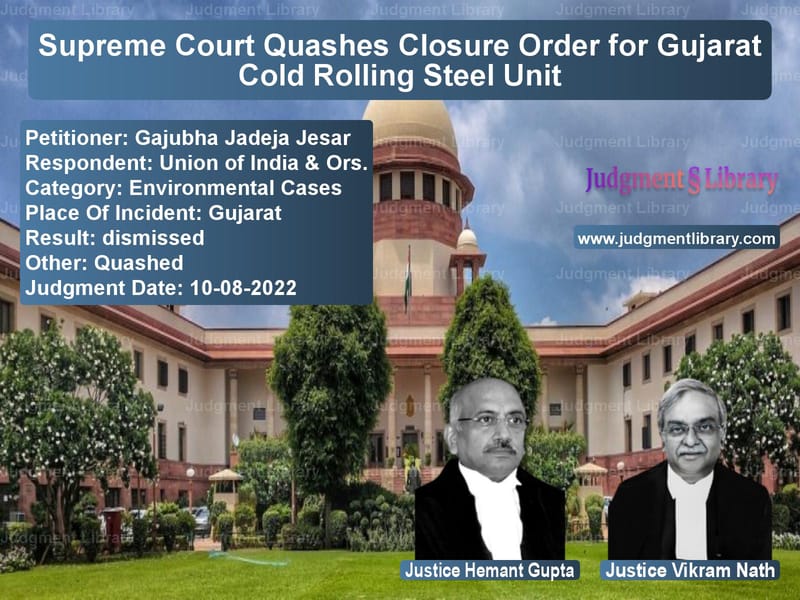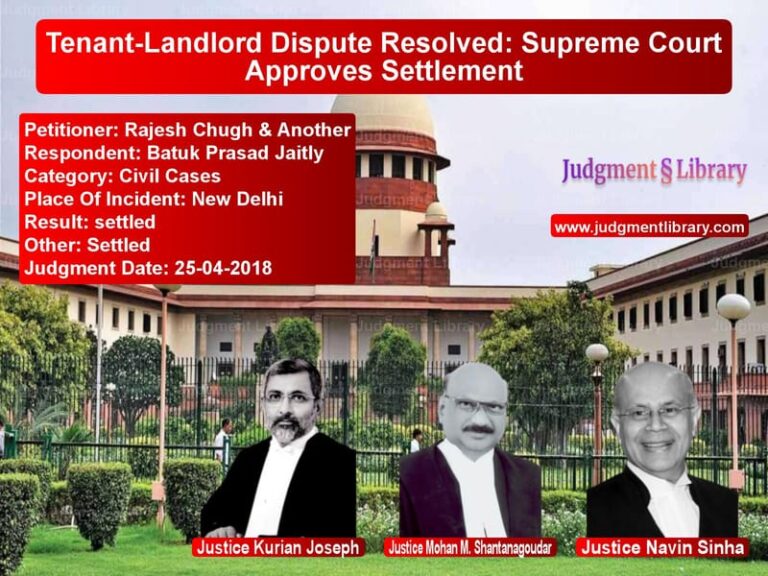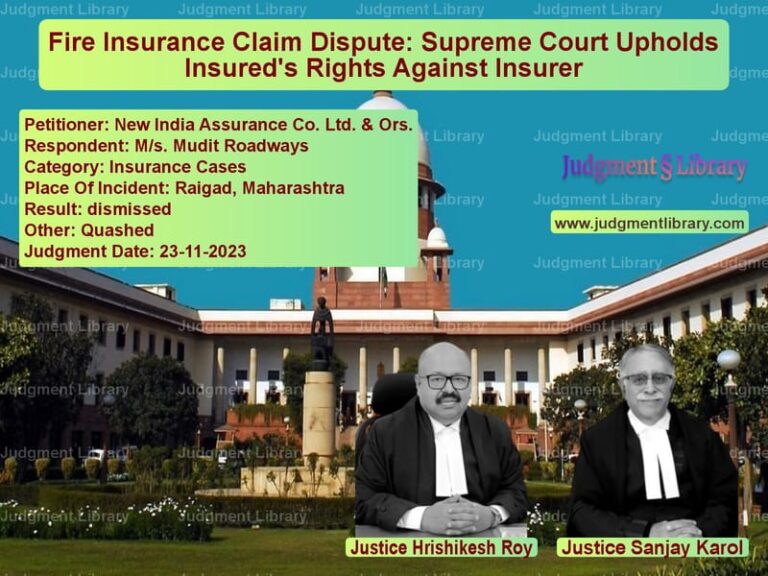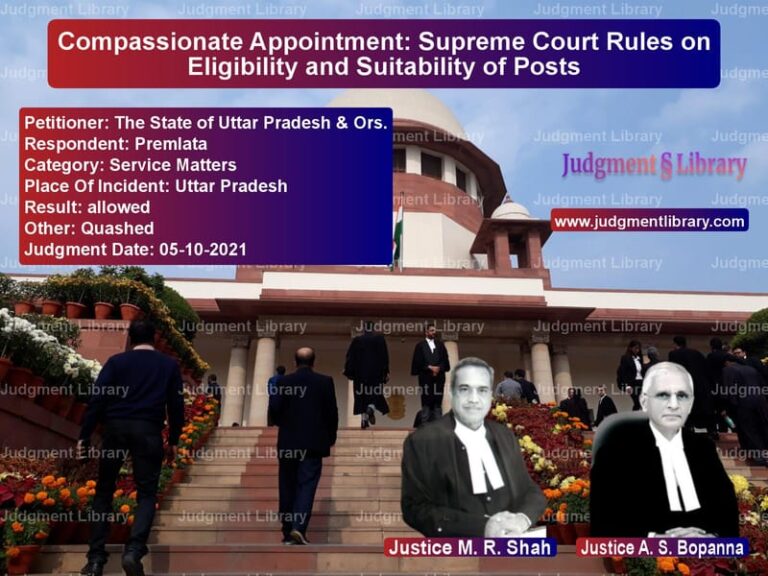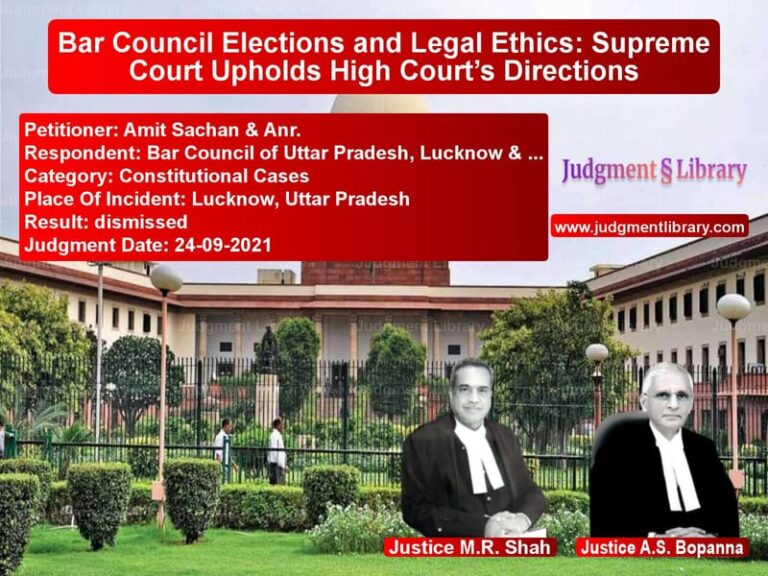Supreme Court Quashes Closure Order for Gujarat Cold Rolling Steel Unit
The Supreme Court of India, in Gajubha Jadeja Jesar v. Union of India & Ors., delivered a crucial judgment concerning the environmental clearance of a cold-rolled steel manufacturing unit in Gujarat. The case revolved around whether such industries require prior environmental clearance under the Environment Impact Assessment (EIA) Notification, 2006. The Court set aside the closure order issued by the Gujarat State Pollution Control Board (GPCB), allowing the industry to seek environmental clearance within the newly granted time frame.
Background of the Case
The case arose when the appellant, Gajubha Jadeja Jesar, filed an application before the National Green Tribunal (NGT) challenging the establishment of a cold-rolled steel plant by a project proponent in Gujarat. Jesar alleged that the unit was set up without obtaining prior environmental clearance, violating the EIA Notification, 2006.
The key facts of the case include:
- The project proponent applied for Consent to Establish (CTE) from the Gujarat State Pollution Control Board and was granted permission.
- The unit was built and subsequently obtained Consent to Operate (CTO) from the GPCB.
- Jesar challenged the operation of the unit on the grounds that cold rolling mills fall under the secondary metallurgical industry category, requiring prior environmental clearance.
- The NGT initially stayed all activities of the project until the Ministry of Environment, Forest, and Climate Change (MoEFCC) determined the applicability of environmental clearance.
- Following an expert appraisal, MoEFCC issued an amendment on July 20, 2022, clarifying the requirement for environmental clearance for such industries.
Petitioner’s (Gajubha Jadeja Jesar) Arguments
The petitioner made the following key arguments:
- The cold rolling unit was established in violation of the EIA Notification, 2006, which mandates prior environmental clearance for secondary metallurgical industries.
- The NGT had jurisdiction to take corrective measures and should have ordered the closure of the unit permanently.
- Allowing the unit to apply for environmental clearance retrospectively was against environmental laws.
- The closure of the unit was necessary to prevent environmental harm.
Respondents’ Arguments
The project proponent and the State of Gujarat defended their position with the following arguments:
- The EIA Notification, 2006, was ambiguous regarding whether cold rolling units required prior environmental clearance.
- The project had obtained all necessary permissions from the GPCB before setting up operations.
- Thousands of similar industries across the country were operating under similar conditions.
- The MoEFCC’s July 20, 2022, amendment provided a one-year period for such units to obtain environmental clearance.
- Closure of the unit would lead to significant economic losses, unemployment, and disruption in the steel sector.
Supreme Court’s Key Observations
The Supreme Court carefully analyzed the facts and arguments and made the following key observations:
- Ambiguity in the EIA Notification: The Court acknowledged that the 2006 notification lacked clarity on whether cold rolling units required prior environmental clearance.
- Impact on Similar Industries: The ruling noted that more than 1,600 similar units were operating in India, and enforcing immediate closures could disrupt the industry.
- Validity of Retrospective Environmental Clearance: The Court accepted the MoEFCC’s clarification that existing units would be granted a one-year period to comply with environmental regulations.
- Economic Considerations: The judgment emphasized that industrial development must be balanced with environmental protection, and a rigid approach could lead to job losses and economic downturns.
- NGT’s Authority: The Court ruled that while the NGT has jurisdiction to enforce environmental compliance, it must also consider regulatory amendments that provide time for compliance.
Supreme Court’s Judgment
Based on its analysis, the Supreme Court ruled as follows:
- The appeal filed by Gajubha Jadeja Jesar was dismissed.
- The closure notice issued by the Gujarat State Pollution Control Board was quashed.
- The project proponent was allowed to operate the unit, provided they obtained environmental clearance within the one-year period granted by the MoEFCC.
- The ruling applied to all similar cold rolling units in the country, ensuring uniformity in regulatory enforcement.
Impact of the Judgment
The Supreme Court’s ruling has wide-ranging implications:
- Clarification on Environmental Clearance: The judgment provides much-needed clarity on the applicability of environmental regulations to cold rolling units.
- Protection Against Arbitrary Closures: The Court’s decision prevents arbitrary shutdowns of industries that had operated under regulatory ambiguity.
- Guidance for Future Compliance: The ruling establishes a clear precedent for industries to comply with environmental laws while allowing time for regulatory adjustments.
- Balancing Development and Environmental Protection: The decision reinforces the need to consider economic impacts while enforcing environmental laws.
Conclusion
The Supreme Court’s decision in Gajubha Jadeja Jesar v. Union of India & Ors. highlights the importance of regulatory clarity and the balance between environmental protection and industrial development. By quashing the closure order and allowing a one-year compliance period, the Court ensured that industries could align with environmental requirements without facing undue hardship. This landmark ruling sets a precedent for similar cases and provides a roadmap for industries navigating evolving environmental regulations.
Petitioner Name: Gajubha Jadeja Jesar.Respondent Name: Union of India & Ors..Judgment By: Justice Hemant Gupta, Justice Vikram Nath.Place Of Incident: Gujarat.Judgment Date: 10-08-2022.
Don’t miss out on the full details! Download the complete judgment in PDF format below and gain valuable insights instantly!
Download Judgment: gajubha-jadeja-jesar-vs-union-of-india-&-ors-supreme-court-of-india-judgment-dated-10-08-2022.pdf
Directly Download Judgment: Directly download this Judgment
See all petitions in Environmental Cases
See all petitions in Public Interest Litigation
See all petitions in Legislative Powers
See all petitions in Judgment by Hemant Gupta
See all petitions in Judgment by Vikram Nath
See all petitions in dismissed
See all petitions in Quashed
See all petitions in supreme court of India judgments August 2022
See all petitions in 2022 judgments
See all posts in Environmental Cases Category
See all allowed petitions in Environmental Cases Category
See all Dismissed petitions in Environmental Cases Category
See all partially allowed petitions in Environmental Cases Category

